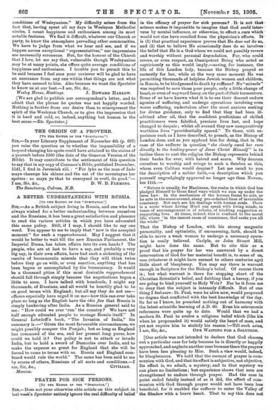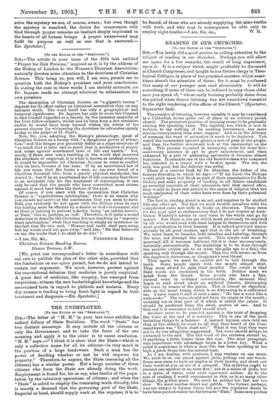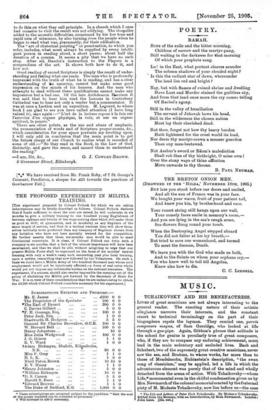I am, Sir, &c., ONE WAITING FOR A SOLUTION.
[Our article was not intended to declare that God chooses out a particular case for help because he is directly or happily approached, and neglects another case because there the prayers have been less pleasing to Him. Such a view would, indeed, be blasphemous. We hold that the essence of prayer is com- munion with God, and that its effect is subjective, not objective. Its effect is, we admit, a mystery, and to that mystery we can place no limitations ; but experience shows that men are strengthened to endure through prayer. Had the case in point ended fatally instead of as it did, the effect of com- munion with God through prayer would not have been less beneficial, for it enabled the sufferer to enter the Valley of the Shadow with a brave heart. That to say this does not
[To THE EDITOR OF THE " SPECTATOR:1
SIR,—The article in your issue of the 18th inst. entitled "Prayer for Sick Persons," inspired as it is by the address of the Bishop of London to the Women's Diocesan Association, naturally devotes some attention to the doctrines of Christian Science. This being so, you will, I am sure, permit me to question both the Bishop's premises and your conclusions. In stating the case in these words I am strictly accurate, for Dr. Ingram made no attempt whatever to substantiate his
own premises.
The description of Christian Science as "a gigantic heresy" depends for its effect rather on historical association than on any intrinsic truth. The word itself has only a geographical and temporal significance. Dr. Ingram has only to cross the Channel to find himself regarded as a heretic by the immense majority of his Irish fellow-subjects, whilst had he been born a few centuries earlier he would have been burned within the limits of his present diocese for whispering the doctrines he advocates openly to-day in the pulpit of St. Paul's.
Now, Sir, you, adopting the Bishop's phraseology, speak of Christian Science as a heresy with "a dangerous power of attrac- tion," and this danger you presently define as a superstructure of "so much that is false and so much that is productive of misery and crime against ascertained laws of life and health." Yet, surely, if. there ever was a teaching in the world that deserved the attribute of empirical, it is what is known as medical science. It would be impossible for Christian Science to come in conflict with its laws, because it has none. If by an ascertained law of life you mean that fire burns a man, no one ever heard of a Christian Scientist who, from a purely physical standpoint, has denied it ; but if by an ascertained law of life you mean that there is an inviolable rule for the treatment of consumption, it can only be said that the people who have committed most crimes against it must have been the doctors of the past.
Of course, if you start with the assumption that Christian Science is "superstitious spiritualism," there is no reason why you should not arrive at the conclusions that you seem to have. au', you evidently do not agree with the Bishop when he says the healing must be effected by a doctor as God's instrument, and as there is nothing to prevent a doctor being "an infidel, heretic, or Turk," this is, perhaps, as well. Therefore, is it quite a sound deduction to describe the Christian Science teaching as "supersti- tious spiritualism," when that teaching is simply an insistence on the fact that He who said, "Heaven and earth shall pass away, but my words shall not pass away," said also, "He that believeth on me, the works that I do shall he do also"
—I am, Sir, &c., FREDERICK DIXON.
Christian Science Reading Rooms, Sloane Terrace, S. W.
[We print our correspondent's letter in accordance with our rule to publish the plea of the other side,.provided that the limitations on our space permit, but we do not intend to restate our argument. We must, however, protest against the conventional delusion that medicine is purely empirical. A great deal of medicine, like surgery, has emerged from empiricism; witness the new bacteriological knowledge and the ascertained facts in regard to phthisis and malaria. Every day science is tending to bring fresh light in regard to both treatment and dia.gnosis.—ED. Spectator.] THE UNEMPLOYED.
[To THE EDITOR OF THE " SPECTATOR:]
Srn,—The letter of "H. H." in your last issue exhibits the radical fallacy of State Socialism. The word " State " has two distinct meanings. It may include all the citizens or only the Government, and to take the force of the one meaning and apply it to the other is to cause confusion. "H. H." says :—" I think it is clear that the State—which is only a collective name for all its citizens—is very much in the position of a large landowner. Such a man has the power of deciding whether or not he will improve his property." Therefore, he argues, the State (meaning all the citizens) has a similar power. But a large number of these citizens who form the State are already doing the work. Employment is found for, let us say, nine-tenths of the popu- lation by the voluntary operations of citizens; and when the "State" is asked to employ the remaining tenth directly, this is merely a demand that the governing part of the State, Imperial or local, should supply work at the expense, it is to
God through prayer remains an instinct deeply implanted in employ eightrtenths.—I am, Sir, &c., R. the hearts of all human beings. A prayer unanswered may fulfil its purpose as well as one that is answered.— ED. Spectator.1
W.
READING IN OUR CHURCHES.
[TO THE EDITOR Or THE "SPECTATOR."] Si,—You lately did a good service in calling attention to the subject of reading in our churches. Perhaps you will allow' me space for a few remarks, the result of long experience, upon it. It is a subject which might profitably be discussed at Church Congresses, and taught to our future clergy in Theo- logical Colleges, in place of less practical matters, which some- times absorb the attention of these; for it must be confessed, that many of our younger men read abominably. It will be something if some of these can be induced to copy those older men you speak of, "whose early training probably dates from the period when dreary intoning was not considered essential to the right rendering of the offices of the Church" (Spectator, September 2nd).
The practice of intoning, however suitable it may be considered, in a Cathedral, seems quite out of place in an ordinary parish church. The prevalent practice of intoning seems to be gradually ruining the speaking voice. The rapidity, too, which is now in fashion, to say nothing of its seeming irreverence, has more serious consequences than some suppose. And so in the delivery of sermons, the want of animation is much to be deplored. You watch the momentary upward glance,a sort of peep at the people, and then the furtive downward look at the manuscript on the desk. This process repeated in unvarying order for some five- and-twenty minutes is apt to grow monotonous, and when enhanced by a pair of glistening spectacles it becomes almost ludicrous. It reminds one of the old Scotchwomanwho compared her minister to a teapot with a broken spout. The tea, she said, was good, but the delivery'was awful.
There is a curious book by Dr. Sheridan, the father of the famous Sheridan, in which he says :—" If my Lords the Bishops would pitch upon this Book as part of their examination for Holy Orders, and make propriety of reading in all future candidates an essential requisite of their admission into that sacred office, they would do more real service to the cause of religion than the most celebrated of their order have ever done by their polemical writings."
The fact is, reading aloud is an art, and requires to be studied like any other art. Not that we need trouble ourselves with the complicated rules met with in books on elocution. These seem for the most part so embarrassing that I do not wonder at Arch- bishop Whately's advice to cast rules to the winds and go by nature. But there is one art which must previously be acquired by all who would read with least fatigue to themselves and with most gratification to their hearers. It is indeed practised uncon- sciously by all good readers, and that is the art of breathing. We must learn to breathe, both inhaling and exhaling, through the nose, not through the mouth. This simple rule must be • practised till it becomes habitual, till it is done unconsciously, naturally, automatically. The breathing is to be done through the nostrils (which are to us what the gills are to a fish), the speaking only through the mouth. This, too, will secure us from the dysphonia clericorum, or clergyman's sore throat. Then again, we must be careful not to talk through the teeth. Some people speak with the mouth almost shut. They seem afraid to open their mouths. The result is that their words are smothered in the birth. Neither must we speak from the throat. Some people who have a fair, natural voice in ordinary conversation, the moment they begin to read aloud adopt an artificial falsetto, discharging the voice by means of the palate. This is almost as objection- able as the nasal twang which is so distressing to a cultivated ear. I have heard it said of such a man : "He has a voice like a corn-crake." The voice should not have its origin in the mouth ; certainly not in that part of it which is called the palate. It should be produced from the chest, pectore at (mo. And to this end it is necessary to hold oneself erect.
Another error to be guarded against is the trick of dropping the voice at the end of a sentence. This is one of the most irritating things to a listener. A learned layman once told me that, at the church he went to, all that they heard of the Com- mandments was "Thou shalt not." What it was that they were not to do was altogether suppressed. The voice should always be sustained to the end. The last word of the sentence should be, If anything, a little louder than the rest. The next paragraph may sometimes with advantage begin in a lower key. What a relief it sometimes is when a man who has been speaking at too high a pitch drops into his natural tone. As I am dealing with cautions, I may venture on one more. We must be on our guard against jerks, jerking out our words. Some men seem to have an engine in their insides, and shoot out their words at you as out of a catapult. The syllables ought to succeed one another in an even flow ; not in a series of jerks, but in a series of waves, mild undo supervenit undam. As to the rate of reading, I would recommend in this, as in so many other things, the golden mean. We must be neither too fast nor too slow. We must neither drawl nor gabble. The former, perhaps, was our danger in former times, but now the regulator seems to have been pushed rather too far towards "Fast." Some men profess
to do this on whet they call principle. In a church which I once had occasion to visit the result was not edifying. The Gospeller added to the acoustic difficulties, occasioned by his low tone and rapid rate of utterance, by also turning from the people when he began to read what was, presumably, for their edification. The "art of rhetorical pointing" or punctuation, to which you refer, includes, what must always be supplied by every intelli- gent person in reading aloud, a short pause; about half the duration of a comma. It seems a pity that we have no such stop. After all, Hamlet's instruction to the Players is a compendium of the art. It shows both how to do it, and how not.
Good reading of sacred Scripture is simply the result of under- standing and feeling what one reads. The man who is profoundly impressed with the truth of what he is reading, and has a clear understanding of its meaning, cannot but make some good impression on the minds of his hearers. And the man who attempts to rixad without these qualifications cannot make any impression but a bad one. Of the late Archdeacon Harrison it was said that to bear him read the Lessons in Canterbury Cathedral was to hear not only a reader but a commentator. It was at once a Lection and an exposition. M. Legonve, to whose book I am glad to see you have called attention (I have long valued it), says again :—" L'art de In lecture repose it la fois sur rexercice d'un organs physique, la you', et sur un organe spirituel, la pensee."
There are other points, as the use and abuse of emphasis, the pronunciation of words and of Scripture proper-names, &c., which consideration for your space prevents my dwelling upon.
I will only add in conclusion that the main point is to get the future clergy of our Church to realise what is recorded of some of old :—" So they read in the Book, in the Law of God, distinctly, and gave the sense, and caused them to understand the reading."
—I am, Sir, &c., G. J. COWLEY-BROWN. 9 Grosvenor Street, Edinburgh.
[I** We have received from Mr. Frank Roby, of 7 St. George's Crescent, Pendleton, a cheque for £25 towards the purchase of Gowbarrow Fell.]
THE PROPOSED EXPERIMENT IN MILITIA TRAINING.






















































 Previous page
Previous page